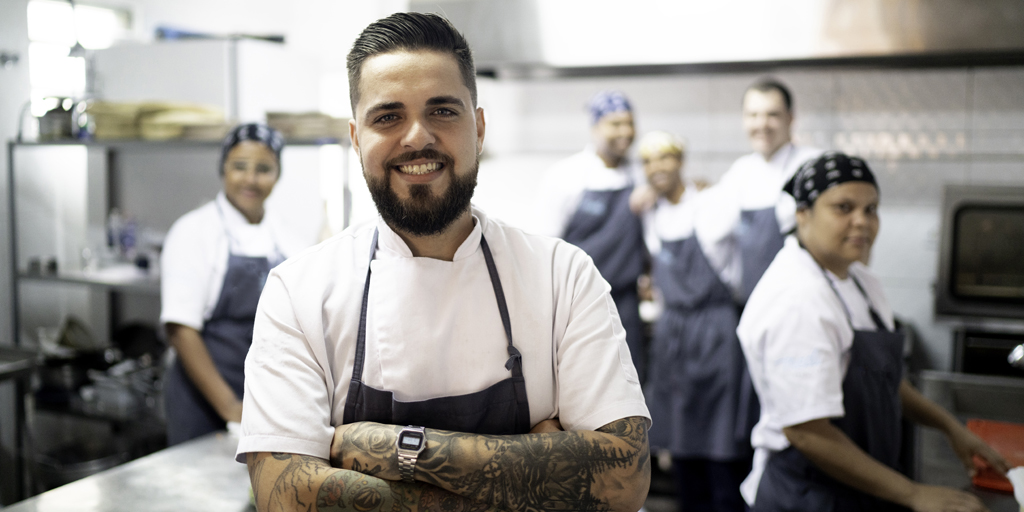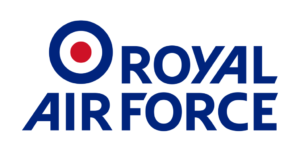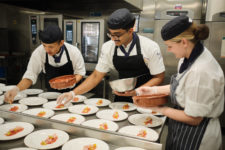
How To Become A Restaurant Supervisor
A great restaurant supervisor is friendly, efficient and takes pride in knowing the likes and dislikes of regular visitors!
Want real-life tips on how to become a restaurant supervisor?
Watch the video!
Restaurant supervisor careers: What’s involved
Getting into restaurant supervisor careers
As a Restaurant Supervisor, you would be responsible for the health and safety procedures, quality standards and staff and customer satisfaction. The nature of the role is both business-oriented and creative, allowing you to dive into tasks ranging from strategic planning to day-to-day management activities.
This role is available at many types of restaurants such as high-end, casual dining and quick service outlets.
Working hours
It is not uncommon for a restaurant supervisor to work over 40 hours a week, often including weekends and evenings.
Shift work and working on public holidays is also typical.
When considering this role, it is important to remember that you must be willing to work until the job is completed, which may mean overtime.
How Much Money Can You Earn As a Restaurant Supervisor?
These LMI Job Trends give you a sneak peek of how much you could earn starting out for this career, and how much your salary could grow with experience.
Salary guide for restaurant supervisor jobs
Restaurant supervisor working in fine dining typically earn between £22,000 to £40,000. In casual dining restaurants, between £20,000 and £30,000 and in fast-food restaurants between £18,000 and £30,000.
Salaries for restaurant managers depend on your location, employer and the type of establishment you work for. Many employers offer perks such as a pension, free meals on shift, staff discounts and private medical insurance. Additionally, it is sometimes possible for restaurant managers to receive bonus payments if they reach the targets set by their head office.
The income data above is from the Hospitality Guild and Prospects. These figures are intended as a guide only.
Skills you need to become a restaurant supervisor
Useful skills to put in your CV for restaurant supervisor jobs:
- ability to lead and motivate a team of staff
- awareness of hygiene, and health and safety regulations
- a flexible and hands-on approach to work
- problem-solving ability
- strong planning and organisational skills
- ability to work independently and make decisions confidently
- strong written and oral communication skills
- ability to cope under pressure in a fast-paced environment
- good business awareness
How do you get these skills?
Vocational qualifications and work experience will help you build these skills over time.
Build Your Skills With the FREE Young Professional Programme

What Qualifications & Training Do You Need For Restaurant Supervisor Careers?
School, College And Training
When considering what you need to enter the hospitality industry, practical experience, strong interpersonal skills and an understanding of business are key. Having a degree is not always a necessity as it’s possible to train on the job and work your way up into the role of a restaurant manager.
Hospitality Apprenticeships
If you want to get straight into a role and don’t have directly relevant qualifications or experience, you can train on the job and earn money at the same time by taking an apprenticeship in hospitality.
These are available at different levels. After gaining some experience you could take the:
- Level 3 Hospitality supervisor advanced apprenticeship
- Level 4 Hospitality manager higher apprenticeship
Once you are ready, the GOV.UK Find an Apprenticeship service can help you to find suitable positions.
Developing Your Skills With Training
If you want to develop your skills in the industry, the type of training opportunities available usually depend on the size of the restaurant you’d be working for and whether it’s an independent operation or part of a chain.
Larger restaurant chains typically offer structured training schemes, while independent restaurants are more likely to offer informal on-the-job training.
Key training areas include:
- First aid
- Health and hygiene
- Management skills
Hospitality Management Training
If you are currently working in a restaurant role you could develop your management skills by taking a relevant hospitality qualification such as:
- Level 3 Diploma in Hospitality Supervision and Leadership
- Level 4 Diploma in Hospitality Leadership
Hospitality Graduate Schemes
If you are interested in joining a graduate recruitment scheme you will need a degree. These schemes are usually available with large restaurants and fast-food chains. Having a degree in the following subjects could be beneficial when applying; business or management, hospitality management or hotel and catering.
Structured management training schemes for graduates generally last between 12 and 18 months. During this time, you could expect to gain practical experience within each function of the restaurant and be assigned a mentor to help you during your initial months.
Who Can Help?
Many professional bodies also offer a range of training opportunities, including activities that count towards continuing professional development (CPD). Find out more below:
- Hospitality Guild – lists training courses including college-based qualifications and apprenticeships, regulation and licensing courses, and CPD options.
- Institute of Hospitality – offers a range of hospitality-related qualifications, professional development workshops, webinars, online courses and networking events.
- UKHospitality – hosts various events across the year and provides publications and resources for members.
What Work Experience Do You Need For Restaurant Supervisor/Manager Jobs?
Work Experience Tips
Gaining relevant work experience is can also be a key component to landing your dream role! If the restaurants you want to work at don’t offer work experience placements, you should consider finding part-time, weekend or summer jobs in restaurants. This way it could be possible to gain experience as you study or apply for positions.

What Does A Restaurant Supervisor Do?
Example restaurant supervisor daily job responsibilities
- plan menus with the chefs
- organise shifts and rotas for kitchen and waiting staff
- manage stock control and budgets
- work closely with food and drink suppliers
- make sure the restaurant follows licensing, food hygiene, and health and safety rules
- recruit new staff and help to train them
- work on plans for large events like weddings or birthdays
- deal with customer feedback
Hospitality Heroes – Episode 1
Choose Hospitality! Meet Tom Kerridge and friends…
Hospitality Heroes – Episode 2
Choose Hospitality! Meet Jamie Jones and friends…
Hospitality Heroes – Episode 3
Choose Hospitality! Meet Luke Frost and friends…
Catering & Hospitality Career FAQs

What would you like to know about catering & hospitality careers? Maybe we can help!
How To Find Restaurant Supervisor Jobs: Next Steps
To find jobs for young people in this role, search on job boards for restaurant jobs with these words like these in the title:
- graduate restaurant manager jobs
- graduate restaurant supervisor jobs
- graduate hospitality management jobs
- hospitality management apprenticeships
- hospitality leadership training
These Youth Friendly Employers offer great opportunities
These Youth-Friendly Employers might be able to help you get great restaurant jobs, training or experience! Take a look.
Catering & Hospitality Career Tips & Opportunities
Catering & Hospitality Career Guides
View job descriptions with average UK salary, useful qualifications and a variety of routes into this career.
See All Our Youth-Friendly Employers

























YES! I Want More Free Careers Help...
So what are you waiting for? Grab your future.































